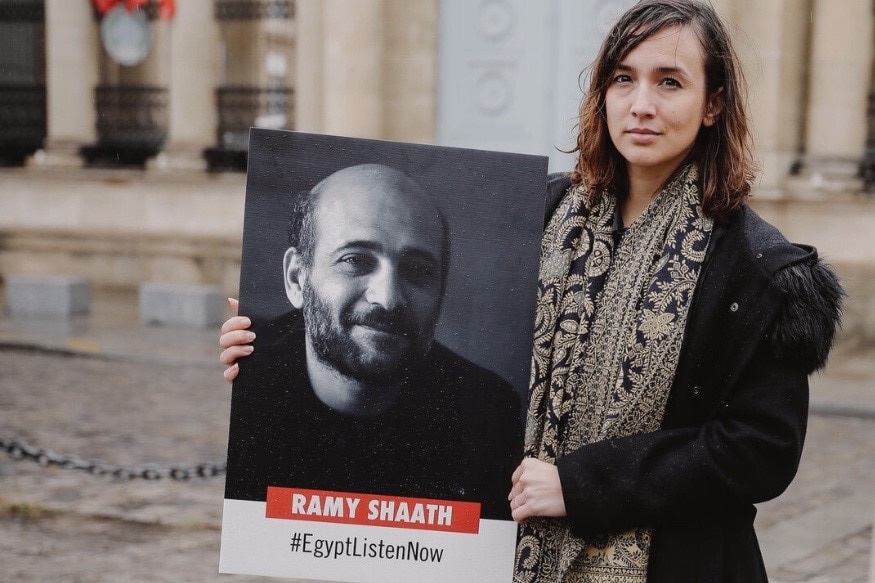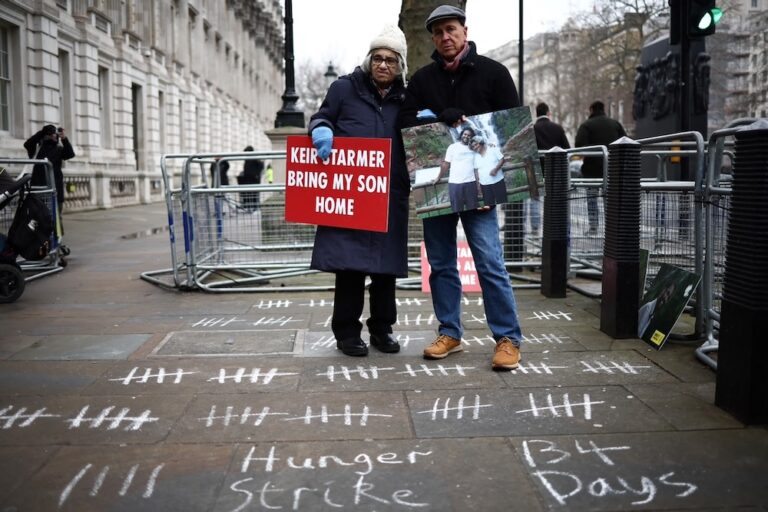Egyptian human rights defenders and UN experts examine how authorities in Egypt have weaponized counter terrorism laws to target activists and human rights defenders, and measures the international community can take to investigate the country's grave human rights violations.
This statement was originally published on cihrs.org on 28 June 2021.
An online event on Egypt was held on the sidelines of the 47th Session of the United Nations Human Rights Council (the Council) featuring Egyptian human rights defenders and UN experts, including the UN Special Rapporteur on Counterterrorism.
The interactive webinar “Weaponizing Counter Terrorism Laws to Silence Human Rights Defenders” highlighted the abusive use of counter terrorism laws in Egypt to target human rights defenders, including the recent widening practice of placing lawyers and human rights defenders on the “terrorist list.” Egypt’s actions violate international human rights law and standards, and the webinar recommended ways in which the UN Human Rights Council can act to improve this situation.
Speakers at the event included Fionnuala Ní Aoláin, UN Special Rapporteur on the promotion and protection of human rights and fundamental freedoms while countering terrorism; Brian Dooley, Senior Advisor to the UN Special Rapporteur on the situation of human rights defenders; Said Benarbia, Director of the International Commission of Jurists’ Middle East and North Africa Programme, and Céline Lebrun Shaath, prominent human rights defender and wife of arbitrary imprisoned Palestinian-Egyptian human rights defender Ramy Shaath. The discussion was moderated by Director of the Cairo Institute for Human Rights Studies (CIHRS), Bahey eldin Hassan.
Earlier this year, at the previous session of the Council on 12 March 2021, more than 30 UN member states delivered a joint declaration condemning the human rights situation in Egypt, including the use of counter terrorism laws to punish peaceful critics.
Human rights defenders have been under attack by the Egyptian government as part of its systematic crackdown on the rule of law and human rights since 2013. In particular, they have been targeted by a sustained security campaign featuring arbitrary arrest and detention and related politicized criminal proceedings based on trumped up “terrorism” charges.
The Anti-Terrorism Law and the Terrorist Entities Law in Egypt utilize vague and overly broad language in their definitions of “terrorist group,” “terrorist crime” and “terrorist act.” The March 2020 amendments to these laws have expanded, among others, the definition of “terrorist entity” and the offense of “funding terrorism,” as well as the effects of the decisions to place individuals on the “terrorist list.” This legal framework and related practices have criminalized the lawful and legitimate exercise of fundamental rights and freedoms, including the right to freedom of expression and association. The Egyptian government has, in effect, classified and begun to treat independent, legitimate human rights activities as a form of terrorism.
Opening the event, CIHRS director Bahey eldin Hassan underscored that the widespread misuse of terrorism laws in Egypt is not limited to human rights defenders alone but targets all those who criticize the government, whether they be secular, Islamic or Christian. Those targeted include journalists, lawyers, academics, businesspersons, former parliamentarians, doctors who criticized the government’s mismanagement of the Covid-19 response, and even football fans and players. Hassan added that this practice is no longer limited to Egypt; other countries in the region, notably Algeria, have begun deploying the same approach. Hassan noted that “the international community has failed to deter Egypt and other countries from using this model… of political retaliation.”
UN Special Rapporteur on Counter-terrorism, Fionnuala Ní Aoláin, noted that there is a global crisis concerning the misuse of counter-terrorism laws against peaceful dissent, which requires concerted effort by the international community to counter. The Terrorist Entities Law and other laws in Egypt, including the 2019 Law on Civic Associations, are vague and contain broad terms used to violate the rights of a wide array of Egyptian citizens, she explained while contending that Egypt’s “counter terrorism law actually legalizes the practice of enforced disappearance and allows for the expansion of prolonged arbitrary detention.”
Brian Dooley, Senior Advisor to the UN Special Rapporteur, highlighted cases of human rights defenders in Egypt who have been charged with terrorism by the Egyptian government. Egypt is expanding the use of counter terrorism laws despite widespread knowledge that many accused of terrorism are not terrorists, noted Dooley who stressed that adequate attention and pressure from the international community can make a difference in helping to reduce sentences or release detainees.
Director of the International Commission of Jurists’ Middle East and North Africa Programme, Said Benarbia, reviewed cases of rights defenders and lawyers subjected to terrorism charges including Alaa Abdel Fattah, Mohamed El-Baqer, Ezzat Ghoneim, Ibrahim Ezz El-Din, and Ibrahim Metwally. In their cases as well as the cases of many other Egyptian citizens, the state has failed provide any evidence proving the terrorism accusations against them. Benarbia warned against allowing a country like Egypt – which has created an “open air prison” through its ubiquitous misuse of counter-terrorism laws – to play a role in defining international standards on this issue. Egypt has increased its efforts at the United Nations in both New York and Geneva to limit or negate human rights standards within counter-terrorism initiatives.
Céline Lebrun, wife of detained human rights defender Ramy Shaath and director of the campaign for his release, presented a detailed testimony about the violations to which her husband has been subjected since his enforced disappearance and subsequent imprisonment on terrorism charges two years ago. Shaath was interrogated about his legitimate activities as a human rights defender, according to Lebrun, who added, “So far… we have not been told nor provided any evidence on why Ramy is detained on terrorism charges.” A UN expert panel has classified Mr. Shaath’s imprisonment as a case of arbitrary detention, and called for his release.
Lebrun has urged the international community and United Nations experts to continue to pressure the Egyptian government to stop using counter terrorism laws to imprison human rights defenders, and to ensure the release of her husband. She emphasized, “Many of those imprisoned are the future of Egypt, not a threat.”
The event was organized by the Cairo Institute for Human Rights Studies (CIHRS), the International Commission of Jurists, Human Rights Watch, International Service for Human Rights, International Federation for Human Rights (FIDH) and Amnesty International.
During closing statements, Dooley described the judicial system as “an official tool for retaliation against human rights defenders, used to implement literally what the government asks of it.” Benarbia said of the judicial system, “it is not an independent system, and since seven years ago, it has become a tool of political pressure, completely subordinate to the political authority and is used to suppress opponents and ensure impunity for Egyptian state officials.”
Bahey eldin Hassan closed the event by reminding UN member states that there is “no longer a judicial system or parliament in Egypt that can hold the executive and security agencies accountable.” The international community, consequently, has heightened responsibility and must take action, including by ensuring the creation of an independent investigation mechanism into human rights violations in Egypt at the UN Human Rights Council.
Watch the full webinar in English here



